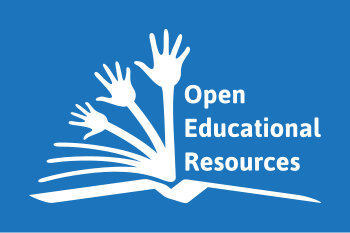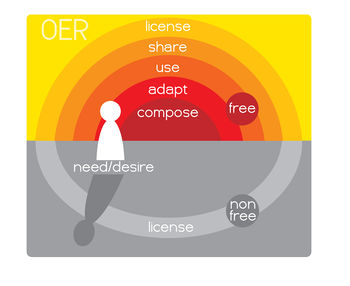Objectives
| Open education practice (#OERuOEP) | |
|---|---|
| Introduction to OER | |
| Introduction to OER | Introduction and objectives | Video signpost | Participate in OCL4Ed workshop | E-learning activity | Summary |
| “ | Those who do not remember the past are condemned to repeat it. | ” |
| —George Santayana[1] | ||
There are many dimensions to the concept of "openness in education." Open educational resources (OERs) are arguably the most prominent manifestation of open education in the formal education sector. This week you will participate in a global online workshop and complete your the first e-learning activity which can be submitted for formal assessment in this course.
After studying this introduction to OER, you will:
|
In this introduction, we begin with a short synopsis of the history of OER and initial microblog reflection.
An abridged OER timeline

- 1994: Wayne Hodgins coined the term "learning object" which popularised the idea that digital materials can be designed and produced in a way to enable reuse in a variety of learning situations.
- 1998: David Wiley coined the term “open content” based on the idea that the principles of free and open source software could be productively applied to learning materials and he created the first widely adopted open license for content (the Open Publication License).
- 2001: Jimmy Wales and Larry Sanger launched Wikipedia, using the concept and technology of a wiki pioneered in 1994 by Ward Cunningham to develop a free online encyclopaedia. By 2003, the Wikipedia community authoring model succeeded in building the largest encyclopaedia in history.
- 2001: Creative Commons was founded providing a standardised legal framework for open content licensing to grant the legal permissions necessary for OER
- 2001: Massachusetts Institute of Technology announced the establishment of its OpenCourseWare initiative to publish university courses for free public access for noncommercial use.
- 2002: UNESCO convened a forum where the concept of "open educational resources" was adopted.
- 2006: In February 2006, the WikiEducator project was established to foster the development of a community of educators from the formal education sector collaborating on the development of OERs. WikiEducator's foundation years were nurtured by the Commonwealth of Learning until becoming an independent project hosted by the OER Foundation in 2009.
- 2006: In August 2006, the Wikiversity project was launched as an official project of the Wikimedia Foundation. Originally conceived as an initiative within Wikibooks, Wikiversity aimed to host learning communities and is the centre for the creation of and use of free learning materials, and the provision of learning activities within the Wikimedia Foundation family of wiki projects.
- 2007: The Open Society Institute (OSI) and the Shuttleworth Foundation convened a meeting in Cape Town which drafted the Cape Town Open Education Declaration to accelerate efforts to promote open resources, technology and teaching practices in education.
- 2008: George Siemens and Stephen Downes offered the first "Connectivism and Connective Knowledge" course which attracted 2,300 learners from the general public in addition to the 25 fee paying students enrolled at the University of Manitoba. This online course trialled the idea of opening teaching using connectivist learning approaches. While not the first course offered openly in parallel with fee paying students, this is the course which led to Dave Cormier to coin the the term "Massive Open Online Course" (MOOC).
- 2009: The OER Foundation was established to provide international networking, leadership and support to educational institutions in achieving their strategic objective using open education approaches.
- 2009: The Peer to Peer University (P2PU) was established as an online community to organize and participate in courses using OER. P2PU is a grassroots open education project that organizes learning outside of institutional walls creating a model for lifelong learning alongside traditional formal higher education.
- 2011: In February 2011, an open meeting to discuss the concept and logic model for implementing the OER university (OERu) was hosted at Otago Polytechnic by the OER Foundation. The OERu is an international collaboration of accredited universities, colleges and polytechnics who will provide free learning opportunities to all students worldwide using courses based solely on OER with pathways to achieve credible credentials.
- 2012: UNESCO convened the World OER Congress on the 10th anniversary since adopting the concept. During this world conference, the 2012 Paris OER Declaration was formerly adopted.
Acknowledgement
Much of the progress towards the mainstream adoption of OER can be attributed to the foresight and funding support of the OER programe of the William and Flora Hewlett Foundation who have provided funding support to a number of projects listed in the abridged history above, including for example, MIT's OpenCourseWare initiative, Creative Commons, Wikipedia, projects lead by David Wiley, WikiEducator, P2PU, the OER Foundation and support leading to the adoption of the UNESCO 2012 Paris OER Declaration.
OER is not a new phenomenon. However the OER movement has gained momentum in the last decade. Reading the abridged summary above, are there any thoughts you would like to share with fellow students by posting on
|

